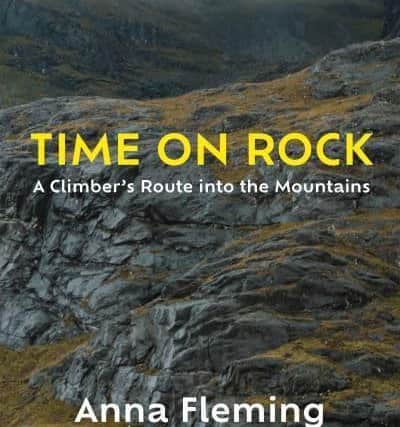Book review: Time on Rock, by Anna Fleming


Understandably, much has been made of the parallels between this absorbing memoir by Edinburgh-based climber and writer Anna Fleming and Nan Shepherd's classic, The Living Mountain. Fleming's fellow climbing scribe Helen Mort has written "it reminds me of Nan Shepherd, only the kind of Nan Shepherd I could go for a pint with", and there are multiple references to Shepherd in the text, which clearly invite the comparison.
True, both writers offer an alternative to the stereotypically masculine way of approaching mountains. Shepherd favoured walking "into" the hills rather than simply "up" them, prioritising the whole, widescreen mountain-going experience over the more blinkered pursuit of ticking off summits. Similarly, Fleming frames rock climbing as "offering a unique way into the landscape".
Advertisement
Hide AdIn terms of her eye for geological detail, however, Fleming perhaps has more in common with another 20th century Scottish writer, Hugh MacDiarmid, in his poem "On a Raised Beach". Just as he writes of his experience of rock as turning "from optik to haptik" and running his fingers over its surface "like a blind man... arris by arris, burr by burr", so it's the intimate physical relationship Fleming develops with the different types of rock she climbs around the UK - "from hard, rounded gritstone to softly sculpted sandstone and razor-edged slate" - that really sets her apart.


There are, after all, countless books about climbing. Some of them, like Joe Simpson's Touching the Void, relate unimaginably brutal survival stories; others, like Tears of the Dawn by free solo climber Jules Lines, catalogue death-defying feats of athleticism. Fleming doesn't have any harrowing near-death experiences to dramatise, and although she has become a very accomplished climber by the final chapters, she doesn't claim to be at the cutting edge of her sport. The principal interest, then, lies not in the physical facts of her climbs but in their cumulative effect on her psyche – as she puts it, the way the rock gradually "becomes engrained into your being" – and her description of this process is both fascinating and beautifully expressed, in a series of glinting, lyrical epiphanies.
Climbing on gritstone in the Peak District, she suddenly becomes aware of the vastness of geological time: "Place your hands onto the gritstone, and you are plunging your fingers into ancient riverbeds and sandbanks." Similarly, after climbing in a Yorkshire quarry, she reflects on the human history tied up in the stones: "Over millennia, person after person... had made contact with these rocks, each bringing their own hopes, dreams, desires and histories to bear upon the stones, which likewise left their own impressions upon us."
In the end, she realises, she isn't climbing in order to prove anything – instead, "I sought total immersion. In the vertical space between the ground and the top of the route, everything else fell away. I sank into the rock." Not unlike Nan Shepherd, then, but with MacDiarmid's enthusiasm for the minutiae of geology.
Time on Rock, by Anna Fleming, Canongate, £16.99
A message from the Editor:
Thank you for reading this article. We're more reliant on your support than ever as the shift in consumer habits brought about by coronavirus impacts our advertisers.
If you haven't already, please consider supporting our trusted, fact-checked journalism by taking out a digital subscription at https://www.scotsman.com/subscriptions